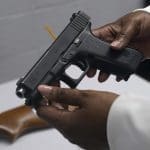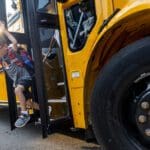Opinion: How civic education helped Germans reckon with their country's past
Americans could take a lesson from the German people when confronting our own history.

Last week a story caught my eye: German citizens were making their way to the train station in Berlin to provide respite to thousands of Ukrainian refugees who suddenly found themselves fleeing the grotesque and violent whims of a maniacal demagogue. I found the story somewhat disorienting. Just 85 years ago, my father, aunt, and grandmother escaped their home in Germany, also fleeing the grotesque and violent whims of a maniacal demagogue. At that time, the train station in Berlin was not a place of refuge. In fact, more than two and half of the six million Jews who ultimately perished were carried on trains that passed through there on the way to killing centers.
What changed over the last 85 years? Within two generations, how did the trains go from transporting innocents to slaughter to transporting innocents to their salvation? This turn of events was not a given, and its cause is not a mystery. It is the predicted result of an intentional decision made by German leaders to transform their society into one that teaches, values, and confronts authentic, accurate, whole histories in order to prevent the atrocities of the Holocaust from ever happening again.
Admittedly, the Germans took some time to get there. Holocaust education did not become compulsory until 1992, 50 years after Hitler launched his “final solution.” There are people who rightly argue that it could be more comprehensive, more culturally responsive, and more consistent; and there certainly have been those that criticize the efforts, arguing that it is too horrifying or will make people feel uncomfortable and guilty. But I have borne personal witness to its positive impact.
In 1997, I traveled to Germany. It was a tough trip, and it was especially hard to visit the Dachau concentration camp. It was a bitterly cold day in January, and I imagined what it must have been like trying to survive a winter in that place. I walked along the wall that separated the quaint town from the crematorium, and I wondered how the villagers outside could have ignored what was happening to the human beings on the other side. As I waited for the bus back to Munich, my heart felt heavy with that feeling of deep distrust I have always carried.
“We were wrong,” I heard a young man say in deeply accented English.
“Excuse me?” I sputtered back.
He said he’d noticed the pain in my face and knew immediately that I was coming back from Dachau. What followed was the truest, most candid conversation I have ever had about atrocity, complicity, responsibility, and restoration. He didn’t make excuses or say that the villagers didn’t know, and he didn’t pretend that he would have behaved differently if he had been there. He was honest, compassionate, and thoughtful; he shared and he listened. He talked about how Germans can only progress if they confront their past. And he told me that he learned this by talking openly and honestly about it at school.
It may be anecdotal, but I can’t help but connect the conversation we had that day with the fact that hundreds of Germans recently showed up at the Berlin train station to help persecuted and displaced refugees. Building consciousness, empathy, and a commitment to justice in a society takes deliberate action and education. Turning pain into progress takes effort.
Here in America, we are at a crossroads. People still face extraordinary injustice, and we don’t seem to know how to talk about our history or even how to dialogue with each other. Having spent my career in education, I am glad to see it at the forefront of public dialogue, being recognized as the change-making agent that it can be, and to witness parents’ desire to be more engaged in their children’s learning.
But we are having the wrong conversation. Instead of talking about what students shouldn’t be learning and banning topics in classrooms, we should be rallying around what our students should be learning. Most parents agree that conscientious debate, accurate history, and access to information are essential for our kids and our country. They understand that it is essential for their children to have the knowledge and skills to thrive in a complicated, imperfect world. This sort of education is essential if we are to build a better society and stronger democracy.
If authentic, honest Holocaust education helped Germany transform its train stations from platforms of genocide to platforms of generosity, what could it do for America? We can be a country where our neighbors feel safe and welcome. We can be a country that stands up for the most vulnerable people, one with the courage to tell all the truths. We can create a society where people from different backgrounds meet at a bus station and are able to reflect plainly on the past and speak of progress. But first, we need to teach them how.
Laila Hirschfeld is an education advocate who has spent her career championing educators and students at all levels, from preschool to community college. Her father, Jack Hirschfeld, escaped Nazi Germany in 1938 as a toddler, one of only 38,000 Jews to successfully leave Austria and Germany that year.
Recommended

Alaska House committee advances, expands proposal to bar trans girls from girls sports
Amended bill would add elementary, middle school and collegiate sports to limits in place for high school
By Claire Stremple, Alaska Beacon - April 16, 2024
Senate clears gallery, passes bill to arm Tennessee teachers
Covenant parents emotional in wake of vote
By Sam Stockard, Tennessee Lookout - April 10, 2024
Not if, but when: Parents of slain Parkland students urge Utah lawmakers to pass school safety bill
The parents of children killed in the 2018 Marjory Stoneman Douglas High School shooting have a stark warning for Utah lawmakers: “It’s not a matter of if, it’s a matter of when and where the next school shooting will happen.”
By Kyle Dunphey, Utah News Dispatch - February 21, 2024








































































